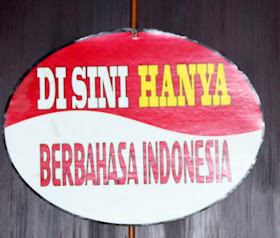Boats stopped: Now
what about those in limbo?
In 1991 Indonesian troops massacred 200 in an East Timor
cemetery, strengthening much of the world’s hostility towards occupation of the
former Portuguese colony.
The Republic’s Foreign Minister, the late Ali Alatas,
diagnosed the pain as ‘a pebble in the shoe’.
Yet it persisted until a new nation was born eight years later.
The footwear irritant has now returned, this time over the
plight of asylum seekers heading for Australia but stranded in Indonesia. There
are around 13,500 – a one-third increase in the past two years.
It’s a small number by world standards [Malaysia has more
than 155,000] but every one a tragedy.
The human faces behind the statistics can be encountered in
a joyless alley alongside a Central Jakarta high rise. Here the desperate, unwanted by Indonesia and
Australia, wait for crumbs of information from the harassed staff of the United
Nations High Commissioner for Refugees.
Those registered after 1 July 2014 have been told they’ll never
be resettled in Australia. They can’t go home, they can’t go on. They are not
allowed to work.
Indonesia has 13 detention centers with a total capacity of
1,300. Those who squat in the kampongs usually survive with remittances from
their homeland.
Thousands of bored and despairing young outsiders hanging
around with no positive future in view is a recipe for strife. Ethnic,
economic, cultural, sexual and religious tensions thrive. The failure of
Indonesia and Australia to fix the problem means the pot simmers.
The issue has been conspiracy theorists’ happy place because
a sea fog of secrecy laid down by the Australian government has smothered
informed debate.
Now some of the mist has been lifted, not by politicians
remembering that in a functioning democracy electors have a right to know
what’s being done in their name, but through the work of an industrious
academic.
For the past four years Dr Antje Missbach has been researching
the issue of asylum seekers stuck in Indonesia.
The results of her work Troubled
Transit has just been published by Singapore’s ISEAS Yusof Ishak Institute.
This is the most substantial report to date, looking at the problem from
Indonesia’s perspective.
The Monash University academic lived in Indonesia as a
teenager. She has been gathering data,
interviewing Indonesian officials, visiting overcrowded detention centers,
talking to what she calls ‘transit migrants’ and convicted people smugglers.
Her book also gives Indonesian and Australian human rights
activists the facts they need to ramp up campaigns for a just and lasting
solution.
Successive Australian governments’ policies have been driven
by voters’ fears of unchecked waves of asylum seekers from conflict-ripped
regions like the Middle East and South Asia. If they make it to Indonesia they
could be ferried south.
Several attempts to solve the problem of ‘crimmigration’
have been tried and discarded. However
the policy now in place jingoistically labelled Operation Sovereign Borders seems to have worked.
It’s an unilateral deterrent justified by the argument that
it saves lives. An estimated 1,550 drowned trying to cross the Arafura Sea between
1998 and 2011.
In Indonesian fishing ports where people smugglers load frail
craft with the desperate, posters warn No
Way – You Will Not Make Australia Home.
More effective have been the messages back to families and
friends from the people caught earlier and transferred to detention centres in
Nauru and the island of Manus reporting that they have uncertain futures and are
living in harsh conditions.
Now boats intercepted by Australian authorities are either
escorted back to the Archipelago, sometimes allegedly entering Indonesian
waters without permission, or the crew and passengers are put in a lifeboat and
pointed north.
In one case a crew was allegedly paid US$30,000 [Rp 422
million] to return asylum seekers. This has also angered Indonesia, and if
correct may have broken international law.
When Susilo Bambang Yudhoyono was president he called for a ‘regional
solution’. Missbach told The Jakarta Post
the definition was unclear and more than 40 nations could be included:
“When SBY initiated the so-called Jakarta Declaration
[August 2013] he invited representatives from countries of origin, transit
countries and resettlement to ‘talk things through’.
“Now under President Joko Widodo ‘regional’ seems to mean
only Southeast Asia. The Bali Process [established in 2002 and co-chaired by
Indonesia and Australia], which used to be the most important international
forum for asylum seekers … seems to have gone rather dormant.”
What could goad the nations into action? For Missbach it’s the possibility of
Sunni-Shia conflict. Many refugees from
Iran and Iraq are Shia, a branch of Islam persecuted in Indonesia. Brawls with
local people have already taken lives.
“I think the situation is actually getting worse,” said
Missbach. “In October extremists raided a temporary shelter in Yogyakarta and
all detainees had to be taken back into detention for their own safety.
“In other places near Medan I hear some landlords no longer
rent their properties to Shia people.”
The latest proposal is to put all transit migrants on an
island isolated from the locals. After the Vietnam War thousands fled by boat
and were housed on Galang Island in the Riau Archipelago.
Vice president Jusuf Kalla and Coordinating Political, Legal
and Security Affairs Minister Luhut Panjaitan raised the idea this year but
have since gone quiet.
“An island would be a very expensive solution as it would
require everything being taken there,” said Missbach. “Once Indonesia creates a
new island settlement the issue is there to stay.
“The original plan for the Galang camp was to use it for
five years. It stayed for almost 20.”
If this pebble isn’t shaken out soon it could cripple
attempts to improve relationships between Indonesia and Australia.
(First published in The Jakarta Post 22 December 20150
##





















